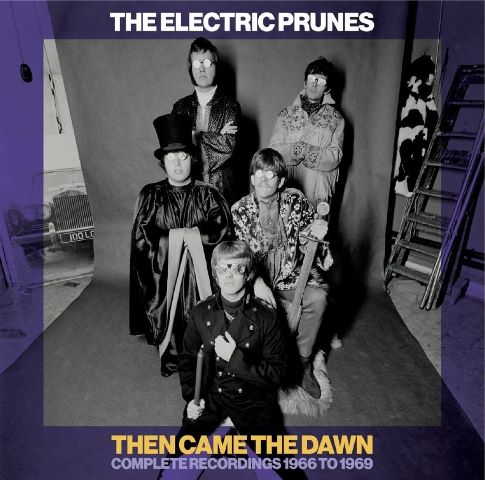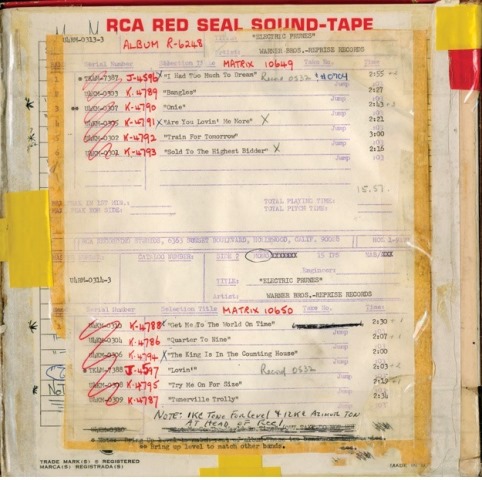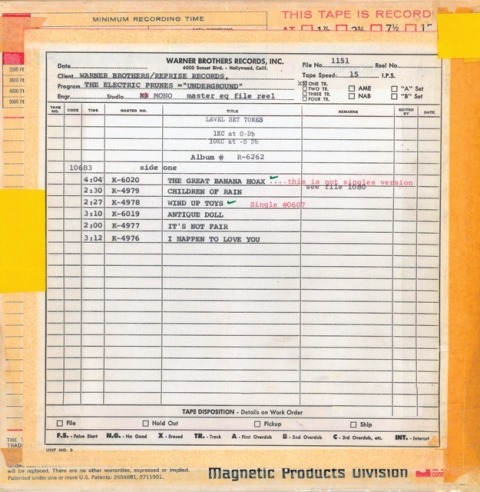The Electric Prunes could feel happy at the end of January 1968. Since landing in London in late November 1967, they’d hung out with Jimi Hendrix and had a photo session with Rolling Stones-favoured photographer Gered Mankowitz. They also met The Beatles at Abbey Road as Magical Mystery Tour was being mixed.
How hot they were live during this brush with Europe is attested to by a French TV appearance, viewable via the internet, and from the recording of a Swedish radio concert included on Disc Six of Then Came The Dawn Complete Recordings 1966-1969 (the show was first legally released in 1997). The latter features paint-peeling versions of their US hits “I Had Too Much to Dream (Last Night)” and “Get me to the World on Time”, as well as their blistering album track “Long Day’s Flight (’Til Tomorrow)”. Another full-bore highlight was the not-yet issued “You Never Had it Better”, which became a B-side in January 1968 after their return to the States. Any happiness began ebbing away.
 Nothing from their most recent third album was played in Sweden. Mass In F Minor had been released in November 1967. From its conception, this was an aberrant album. The Prunes’s second album, August 1967’s Underground hadn’t sold as well as expected so issuing a rock version of a mass, sung in Latin, was supposedly going to do the trick commercially. On Side One, some members of the band were heard alongside session players on some of the tracks. Elsewhere, producer David Axelrod supplemented the session players with members of Canadian band The Collectors. Axelrod wrote all the tracks. Before this, Electric Prunes records has been all thiers.
Nothing from their most recent third album was played in Sweden. Mass In F Minor had been released in November 1967. From its conception, this was an aberrant album. The Prunes’s second album, August 1967’s Underground hadn’t sold as well as expected so issuing a rock version of a mass, sung in Latin, was supposedly going to do the trick commercially. On Side One, some members of the band were heard alongside session players on some of the tracks. Elsewhere, producer David Axelrod supplemented the session players with members of Canadian band The Collectors. Axelrod wrote all the tracks. Before this, Electric Prunes records has been all thiers.
In September 1968 a further assumedly Electric Prunes album followed. Release Of An Oath was another Axelrod vehicle. By this time the band had fallen apart, so no original Prunes could contribute. There were none left, yet the records credited to them kept on coming.
A final hoorah on vinyl arrived In June 1969 with Just Good Old Rock And Roll, credited quixotically to the New, Improved, Electric Prunes. Again, any original members were long gone. It was, and remains, dreadful. Boogie rock and vaguely Vanilla Fudge-ish moves sat alongside the odd nod to The Moody Blues. By the end of 1970, the people currently trading as The Electric Prunes put the name to bed.
 It all began so well. From the Los Angeles area, the Prunes were first named The Sanctions and then Jim and The Lords. They rehearsed in a garage. Through local connections, they hooked up with Dave Hassinger who was engineering Rolling Stones sessions. He set them to work at Leon Russell’s home studio, pushed them to change their name to something groovy and got them signed under his direction to the Reprise label. (pictured left, the master tape for the eponymous first Electric Prunes album)
It all began so well. From the Los Angeles area, the Prunes were first named The Sanctions and then Jim and The Lords. They rehearsed in a garage. Through local connections, they hooked up with Dave Hassinger who was engineering Rolling Stones sessions. He set them to work at Leon Russell’s home studio, pushed them to change their name to something groovy and got them signed under his direction to the Reprise label. (pictured left, the master tape for the eponymous first Electric Prunes album)
After a first single in May 1966, “I Had Too Much to Dream (Last Night)” was issued that November. It hit the charts and their reputation was assured, a status Lenny Kaye recognised when he included them on Nuggets in 1972. “I Had Too Much to Dream (Last Night)” and its March 1967 follow-up “Get me to the World on Time” were A+++ psychedelic punk monsters with an enviable pop edge. While their first, eponymous, album is intermittently hot their second, Underground, is one of 1967’s classics. All the above is, in essence, the saga delineated by Then Came The Dawn. The whole thing is akin to The Monkees story in reverse.
This six-disc set includes the five Sixties’ albums issued under The Electric Prunes banner. Their original-member reunions from 2001 and later are outside the scope of this package. The first album, Underground and Mass In F Minor are heard in their mono and stereo versions. All the singles, which had unique mixes if they were also album tracks, are collected as is their Vox Wah Wah Pedal radio ad, their fantastic film soundtrack contribution “Shadows”, the Swedish radio concert and four pre-Prunes Jim And The Lords demos. The booklet digs into the story from the band's perspective, outlines the tortuous line-up changes, the drawn-out death rattle of the various zombie Prunes and how what was deceitfully named did not necessarily mean it was the band with that name.
 The impressive remastering is done anew from the master tapes, so this is as good as it’s going to get sound-wise. It’s the last word on The Electric Prunes. But ever-present is the issue of what constitutes an Electric Prunes? Whether or not any of the band contributed to Mass In F Minor and to what degree, it was David Axelrod’s handiwork. Release Of An Oath is all about Axelrod. (pictured right, the master tape for the second Electric Prunes album, Underground)
The impressive remastering is done anew from the master tapes, so this is as good as it’s going to get sound-wise. It’s the last word on The Electric Prunes. But ever-present is the issue of what constitutes an Electric Prunes? Whether or not any of the band contributed to Mass In F Minor and to what degree, it was David Axelrod’s handiwork. Release Of An Oath is all about Axelrod. (pictured right, the master tape for the second Electric Prunes album, Underground)
Discs One, Two, Five and Six are what count. What’s on these discs is frequently magnificent. This is the real last word on The Electric Prunes before the sleights of hand. As for those last three albums, numbers three and four slot into a putative Axelrod chronicle. A snippet of Mass In F Minor might have cropped up in Easy Rider and Release Of An Oath had a slightly later afterlife through being sampled, but whatever their musical merits both albums are about their producer’s continuum not the band named on the sleeves. Just Good Old Rock And Roll is rubbish and though stylistically different to its long-playing predecessor is about as much to do with The Electric Prunes proper as Release Of An Oath. Obviously, this clunker is here for the sake of completeness.
The essential parts of the diligent Then Came The Dawn Complete Recordings 1966-1969 have to be heard, but what was sold in shops as The Electric Prunes was not necessarily what it was branded as. And as it was then, so it is now.
- Next week: Looks Like Stormy Weather 1969-1975 - the moody country of Sammi Smith
- More reissue reviews on theartsdesk
- Kieron Tyler’s website















Add comment